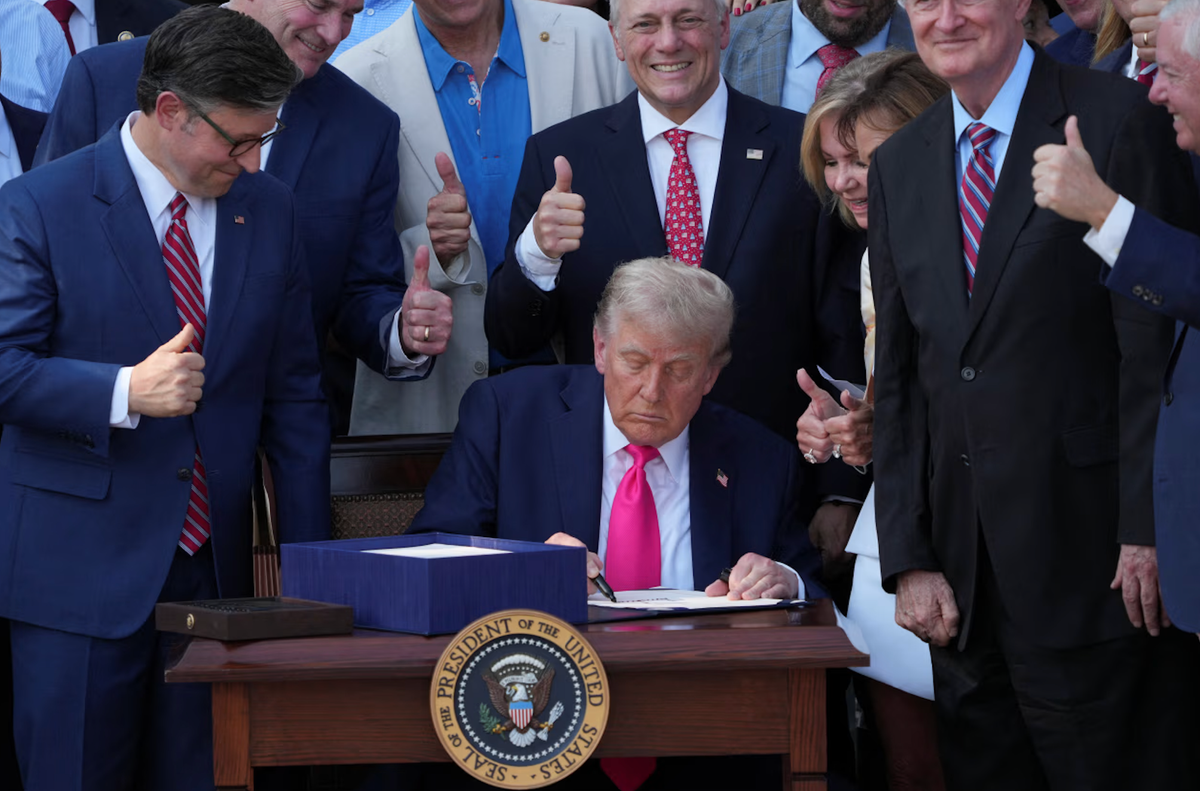Trump's Tax Law Sweetens Secondary Deals in Venture Capital

Analyzing the Fiscal Trade-offs in the "One Big Beautiful Bill"
President Trump's "One Big Beautiful Bill Act," signed into law on July 4, 2025, represents a significant shift in tax policy that will reshape venture capital economics. While the legislation extends substantial benefits to startup founders and investors, these changes come with considerable fiscal costs and raise questions about long-term sustainability in an era of mounting federal deficits.
QSBS Expansion: Benefits and Budgetary Concerns
The law's most consequential change for the startup ecosystem is the expansion of Qualified Small Business Stock (QSBS) benefits. The modifications are substantial:
Increased Exclusion Thresholds: The tax-free gain limit has increased from $10 million (or 10x investment) to $50 million per company for stock acquired after July 4, 2025. While this provides substantial relief for successful exits, it also represents a significant reduction in federal tax revenue during a period when the national debt exceeds $33 trillion.
Modified Holding Period Requirements: The law introduces a graduated benefit structure that departs from the previous five-year requirement:
- 3-4 years: 50% of gains excluded from taxation
- 4-5 years: 75% of gains excluded
- 5+ years: 100% excluded (up to the $50 million threshold)
These changes will likely accelerate secondary market activity, as early employees and investors can now realize meaningful tax benefits without committing to the full five-year holding period. However, this acceleration may also reduce the intended policy goal of encouraging long-term investment horizons.
Secondary Market Implications
The revised holding period structure will likely increase liquidity in private secondary markets. Early employees seeking partial liquidity events—historically deterred by unfavorable tax treatment—now face materially lower effective tax rates on transactions occurring after three years of ownership.
This development addresses a legitimate concern within the startup ecosystem, where employees often find themselves equity-rich but cash-poor, unable to realize value from their compensation without punitive tax consequences. However, critics argue that these benefits disproportionately favor high-income individuals in an already regressive tax system.
The practical impact extends beyond individual tax planning. Secondary market platforms and wealth management firms are already adjusting their advisory models to account for the new optimization strategies these rules enable.
Eligibility Requirements Remain Restrictive
Despite the expanded benefits, QSBS qualification criteria remain largely unchanged and continue to limit the provision's scope:
- Companies must be domestic C-corporations
- Assets cannot exceed $50 million when stock is issued
- At least 80% of assets must be used in active business operations
- Certain industries remain excluded (finance, hospitality, farming, professional services)
Importantly, the requirement for direct acquisition from the issuing company persists. This means secondary purchasers cannot claim QSBS treatment, limiting the benefits to employees, founders, and original investors while maintaining some policy rationale around encouraging direct investment in small businesses.
Additional Business Tax Provisions
The legislation extends beyond QSBS modifications to include several other measures affecting startup operations:
Research and Development Expensing
The law restores immediate deductibility for domestic R&D expenses, reversing a 2022 change that required five-year amortization. For technology companies and research-intensive startups, this change improves cash flow and reduces effective tax rates on innovation spending.
While economically beneficial for growth companies, this provision represents one of the law's most expensive components, with estimated revenue losses exceeding $200 billion over the decade.
Bonus Depreciation Restoration
The legislation reinstates 100% bonus depreciation for qualifying property acquired after January 19, 2025. This allows immediate expensing of equipment and other capital investments rather than multi-year depreciation schedules.
For capital-intensive startups, this provision can meaningfully improve early-stage cash flow, though it also accelerates tax deductions that would otherwise be spread over time.
Pass-Through Entity Benefits
The 20% Section 199A deduction for qualified business income becomes permanent, with expanded income thresholds. This benefits startups structured as partnerships, LLCs, or S-corporations, though the economic impact varies significantly based on business type and income levels.
Estate and Gift Tax Modifications
The legislation increases estate and gift tax exemptions to $15 million per individual, creating expanded wealth transfer opportunities. For successful entrepreneurs, this facilitates tax-efficient transfers of startup equity to family members or charitable entities.
Individual Tax Provisions: "Trump Accounts"
The law introduces tax-advantaged savings accounts for children, allowing annual contributions up to $5,000 with qualified distributions taxed at capital gains rates. While potentially beneficial for long-term family wealth planning, these accounts primarily benefit higher-income families with disposable income for additional savings vehicles.
Fiscal Considerations and Policy Trade-offs
The Tax Foundation estimates the legislation will reduce federal revenue by approximately $4 trillion over the next decade on a conventional basis. The Committee for a Responsible Federal Budget projects even higher costs when accounting for debt service and economic feedback effects.
These revenue reductions occur against a backdrop of structural fiscal challenges. The Congressional Budget Office projects federal deficits exceeding $1 trillion annually for the foreseeable future, with debt-to-GDP ratios approaching historic highs outside of wartime periods.
Carried Interest: Status Quo Maintained
Despite campaign rhetoric about eliminating the "carried interest loophole," the final legislation preserves current treatment for investment fund managers. General partners continue to benefit from capital gains rates on carried interest held for more than three years, rather than ordinary income tax rates.
This outcome reflects the significant lobbying pressure from the private equity and venture capital industries, which argued that changes would reduce investment in domestic businesses and startup formation.
Strategic Planning Implications
The law's provisions create several considerations for startup stakeholders:
Exit Timing: The graduated QSBS holding periods introduce new optimization variables around liquidity timing. The tax benefit differential between years three and five may influence secondary market participation and IPO timing decisions.
Entity Structure: Enhanced business deductions strengthen the relative attractiveness of C-corporation structures for QSBS-eligible companies, though founders should weigh these benefits against operational complexity and double taxation concerns.
Estate Planning: Higher exemption amounts create opportunities for intergenerational wealth transfers, though such strategies require sophisticated planning and legal counsel.
Limitations and Sunset Provisions
Many provisions include sunset dates, with various benefits scheduled to expire between 2028 and 2030. This creates planning uncertainty and may lead to accelerated transactions as expiration dates approach.
The temporary nature of many benefits also raises questions about long-term policy coherence and the potential for future legislative reversals, particularly if political control changes or fiscal pressures intensify.
Conclusion
The "One Big Beautiful Bill" represents a significant expansion of tax benefits for startup founders and investors, with the QSBS modifications likely to have the most immediate impact on venture capital markets. The shortened holding periods and higher exclusion thresholds will probably increase secondary market liquidity and improve exit economics for eligible companies.
However, these benefits come at substantial fiscal cost during a period of growing budget deficits and debt concerns. The legislation reflects a policy choice to prioritize economic growth through tax reductions, while deferring questions about long-term fiscal sustainability.
For startup stakeholders, the immediate impact is favorable, creating new optimization opportunities and reducing effective tax rates on successful exits. Whether these benefits justify their budgetary costs, and whether they can be sustained in their current form, remains an open question that will likely be revisited in future legislative cycles.
Sources:
- Holland & Knight Legal Analysis: "One Big Beautiful Bill Act Increases Tax Benefits for Qualified Small Business Stock" (July 2025)
- Tax Foundation: "Trump Tax Cuts 2025: Budget Reconciliation" (July 2025)
- Bankrate: "Trump's Tax Law: What The Megabill Means For Your Money" (July 2025)
- RSM: "Congress passes tax bill addressing TCJA extensions and business tax relief" (July 2025)
- Fortune: "GOP bill cuts social spending—but popular tax break for hedge funds survives" (May 2025)
- KBKG Tax Insight: "One Big Beautiful Bill - 2025 Tax Changes and Summary Chart" (July 2025)
- Bipartisan Policy Center: "What's in the 2025 House Republican Tax Bill" (2025)




